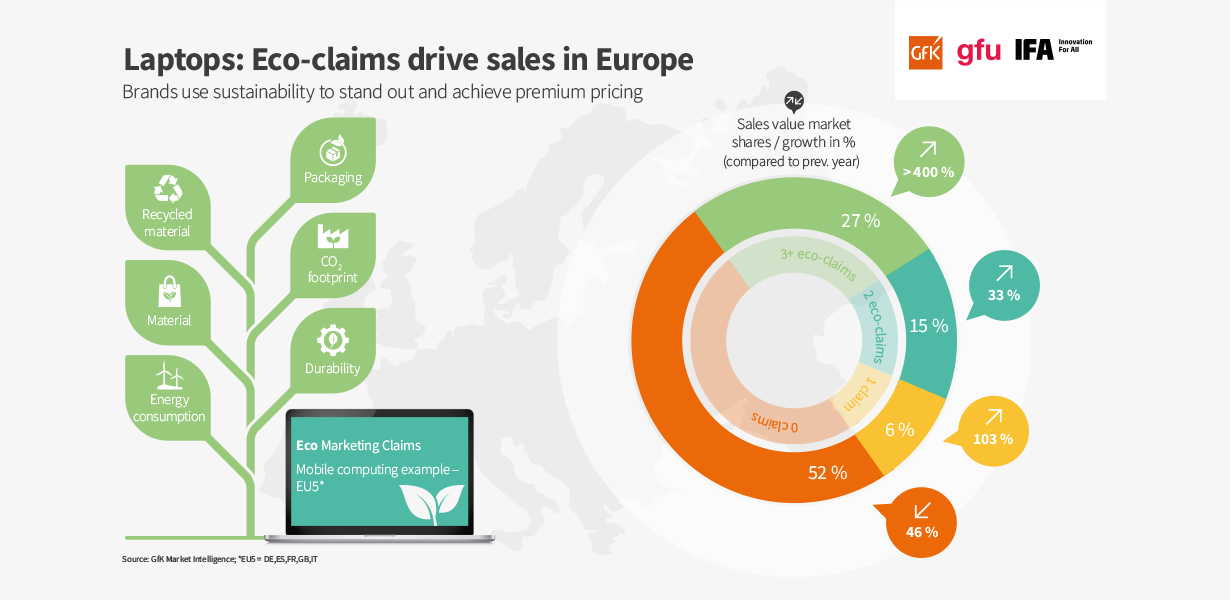News
Sustainability – reloaded in 2024
)
German article below
Sustainability is a significant long-term consumer value. However, the recent cost of living crisis focused people’s attention on economic security, while protecting the environment dropped from its 2021 peak of 16thrank in their most important personal values, to 21st rank last year. But, this is still well above the 2015 level of 25th. (Global GfK Consumer Life study 2023)
With inflation stabilizing and consumers starting to feel better-off compared to 2023, it’s likely that they will turn again to sustainability.
Green legislation: drivers for innovation and pricing
Europe’s energy labels have had a core impact on assortment and innovation. In 2021, the rate of new home appliance products launched was much higher for those that had the new energy labels than for those that did not. Similarly, for products with the new labels, only nine percent of sales last year were of items more than three years past their launch date, while, for products without the new label, that figure is almost 50 percent.
Regulatory interventions influence price trends and drive premiumisation. New, regulation-compliant products are being offered at higher prices, which is driving up the average selling price (ASP) in the respective categories. The recent ban on energy efficiency classes F and G for household appliances is very likely to lead to strong product range rotation and an increase in ASP. In February of this year, refrigerators in these energy classes still accounted for 30 percent of all sales in Europe.
More and more regulations are coming into place as the EU races to achieve the 2030 / 2050 climate goals it has committed to. Most notably, in 2025, a new energy label for smartphones and tablets will become mandatory, which we can ultimately expect to impact assortment and prices.
Beyond energy labels: Eco claims promise success
To understand the success of brands’ eco-claims, GfK started monitoring seven different types of eco-claims. The most common claims are eco packaging, recycled material and CO2 footprint – and laptop vendors are increasingly promoting their products with these three claims. According to gfknewron, 27 percent of sales revenue for laptops sold in EU5 countries* between March 2023 and February 2024 came from products with three or more eco claims – and these products outperformed the negative market with an outstanding triple-digit growth rate!
What does it all mean?
For consumers, the environment is a core, long-term priority that outlives short-term distractions from competing concerns. Leading indicators are already telling us that sustainability will have a stronger consumer voice again this year. Many brands are executing green strategies, and highly aspirational brands in particular have realized the potential to differentiate themselves and justify their price premium by meaningful and genuine eco-initiatives.
*EU5: France, Germany, Great Britain, Italy, Spain
---- German article ----
Nachhaltigkeit kehrt 2024 zurück ins Rampenlicht
Nachhaltigkeit ist und bleibt wichtig im persönlichen Wertesystem für Verbraucher:innen. Doch die jüngsten Krisen, zum Beispiel bezogen auf Lebenshaltungskosten, haben die Prioritäten verschoben und wirtschaftliche Sicherheit in den Fokus gerückt. Im Ranking der persönlichen Werte rutschte Umweltschutz im vergangenen Jahr auf Platz 21 ab – 2021 lag er noch auf Platz 16. Langfristig betrachtet zeigt er aber eine positive Entwicklung, so wurde ihm 2015 von den Befragten nur Platz 25 zugewiesen (Quelle: Global GfK Consumer Life Study 2023). Mit einer sich stabilisierenden Inflation und einer verbesserten wirtschaftlichen Lage im Vergleich zu 2023 ist auch zu erwarten, dass das Interesse an Nachhaltigkeit wieder an Fahrt aufnimmt.
Grüne Gesetzgebung: Treiber für Innovation und Preisgestaltung
Die europäischen Energielabels beeinflussen Produktsortimente und treiben Innovationen voran. 2021 stieg die Zahl neu eingeführter Haushaltsgeräte mit den neuen Labels sprunghaft an und diese Produkte dominierten den Markt: Lediglich 9 Prozent der Verkäufe entfielen auf Artikel, die bereits länger als drei Jahre im Verkauf sind, während es bei Produkten ohne die neue Kennzeichnung fast 50 Prozent waren.
Regulatorische Eingriffe beeinflussen die Preisentwicklung und treiben die Premiumisierung voran. Neue, Energielabel-konforme Produkte werden zu höheren Preisen angeboten, was den durchschnittlichen Verkaufspreis (ASP) in den jeweiligen Kategorien nach oben treibt. Das jüngste Verbot der Energieeffizienzklassen F und G bei Haushaltsgeräten wird wiederum für eine Sortimentrotation und einen Anstieg des ASP sorgen. Im Februar dieses Jahres machten Kühlschränke dieser Energieklassen noch immer 30 Prozent aller Verkäufe in Europa aus.
Im Wettlauf der EU zur Erreichung ihrer Klimaziele für 2030 und 2050 treten immer mehr Vorschriften in Kraft. Ab 2025 wird ein neues Energielabel für Smartphones und Tablets verpflichtend, was das Sortiment und die Preise erheblich beeinflussen dürfte.
Jenseits von Energielabels: Eco-Werbung verspricht Erfolg
Eco-Claims, also Werbung mit ökologischen Botschaften, gewinnen an Bedeutung und treiben den Erfolg von Marken voran. Die GfK hat sieben verschiedene Ausprägungen dieser Claims untersucht, wobei die häufigsten Angaben die Verpackung, recyceltes Material und den CO2-Fußabdruck betreffen. Auch Laptop-Hersteller nutzen diese Claims zunehmend, um ihre Produkte zu bewerben: Laut gfknewron entfallen 27 Prozent des Umsatzes der Laptops, die zwischen März 2023 und Februar 2024 in den EU5-Ländern* verkauft werden, auf Produkte, die mit drei oder mehr Eco-Claims werben. Diese Produkte verzeichneten eine beeindruckende dreistellige Wachstumsrate.

Nachhaltigkeit Reloaded
Für Konsument:innen bleibt die Umwelt und ihr Schutz eine zentrale, langfristige Priorität, die kurzfristige Ausschläge durch andere Themen überdauert. Frühindikatoren zeigen, dass Nachhaltigkeit in diesem Jahr wieder stärker ins Bewusstsein der Menschen rückt. Viele Marken setzen bereits auf grüne Strategien. Und besonders Premiummarken haben das Potenzial erkannt, sich durch aussagekräftige und authentische ökologische Initiativen von Mitbewerbern abzuheben und dadurch ihre Premiumposition zu rechtfertigen.
*EU5: Frankreich, Deutschland, Großbritannien, Italien, Spanien

